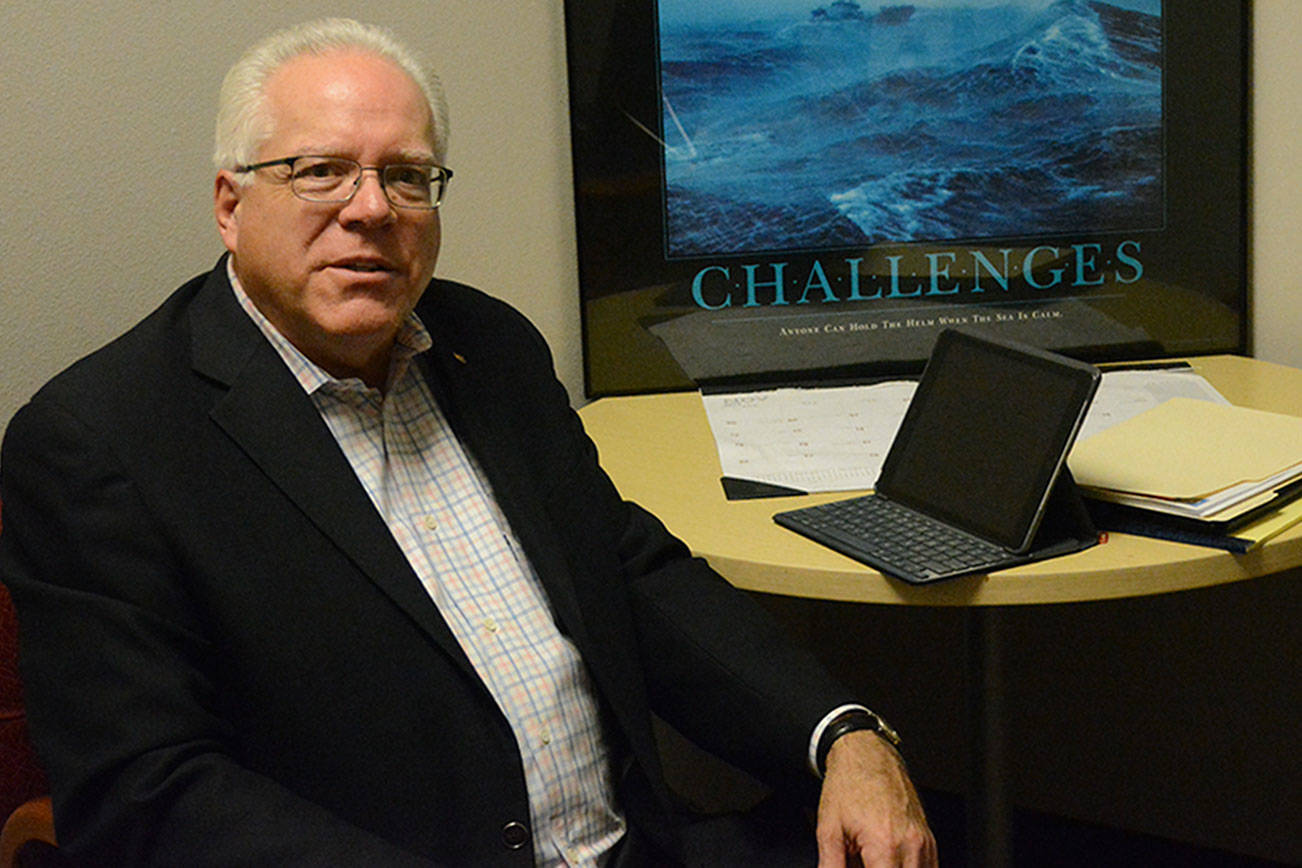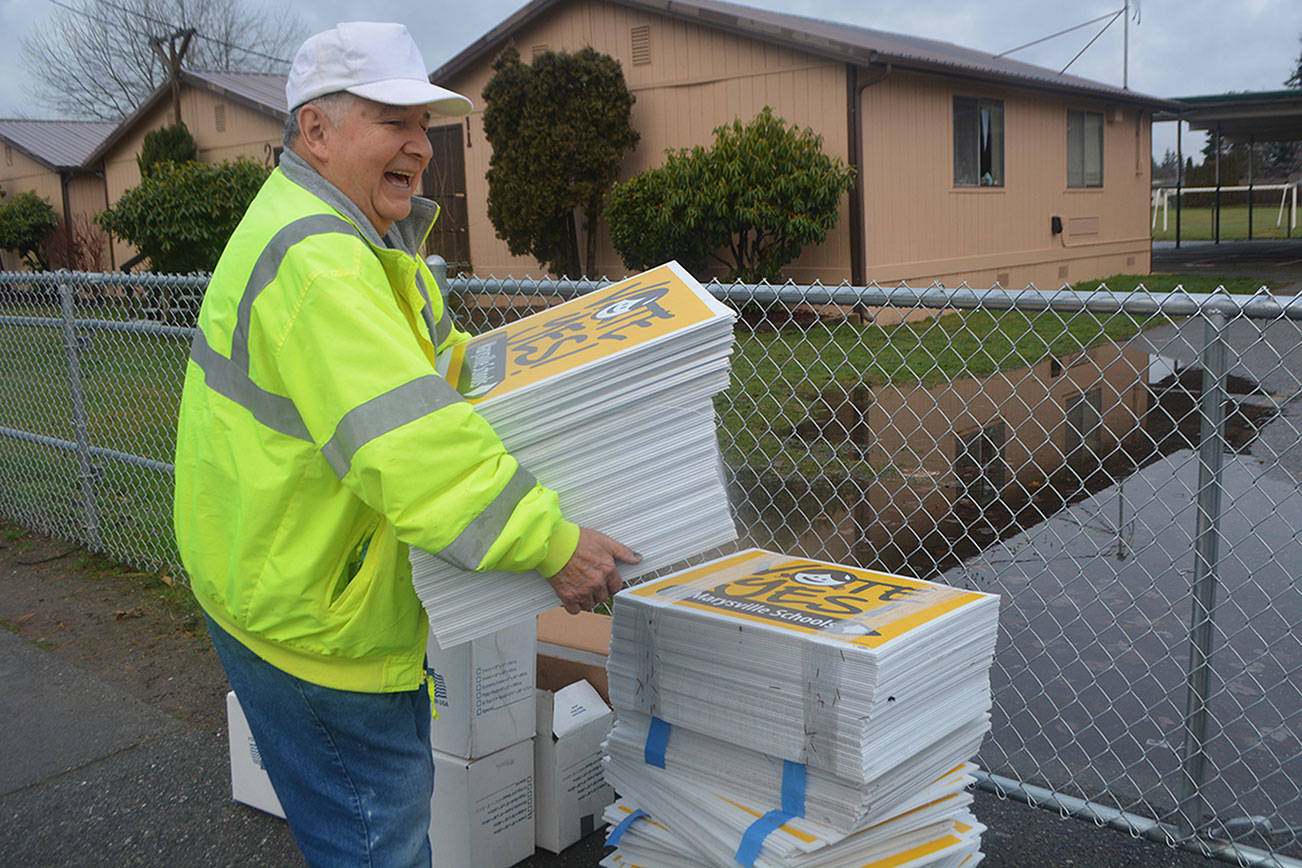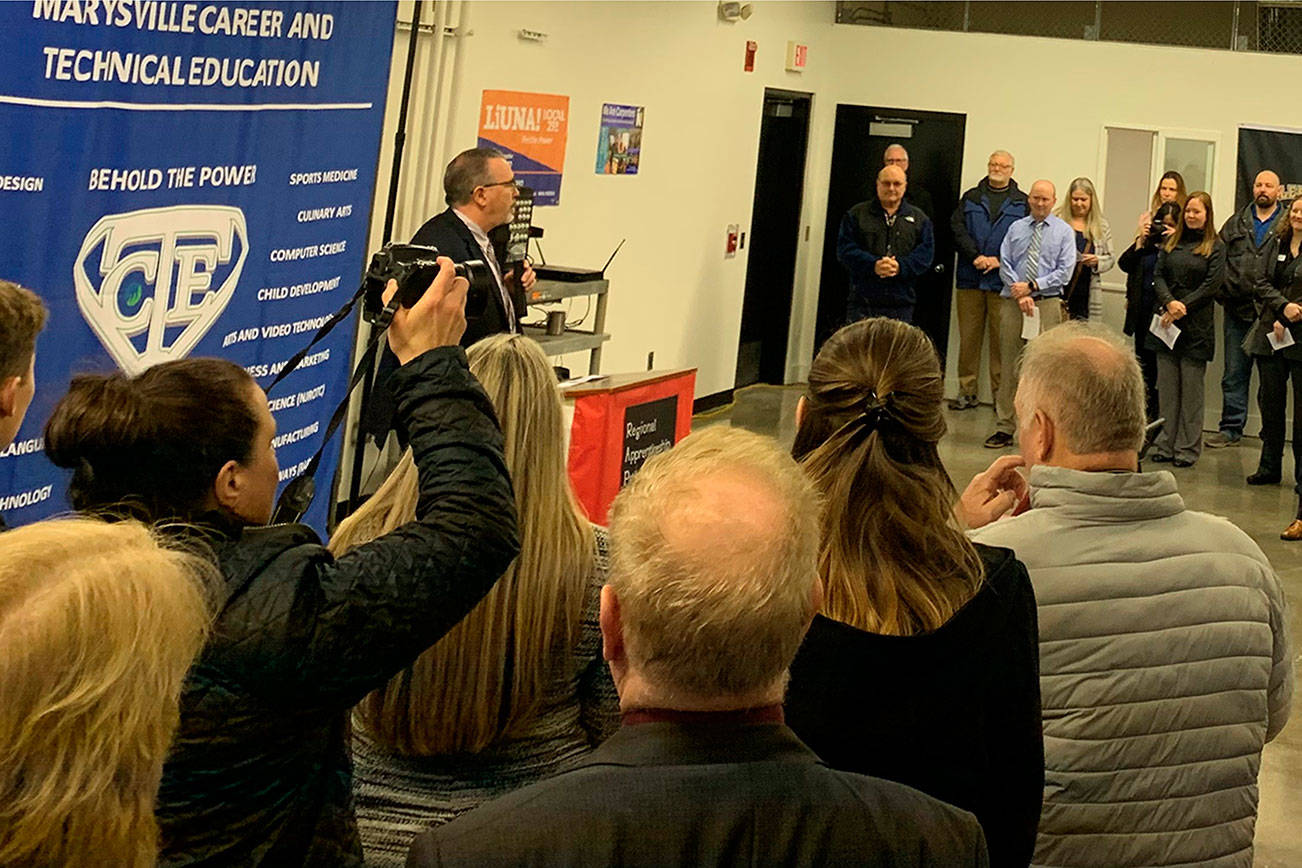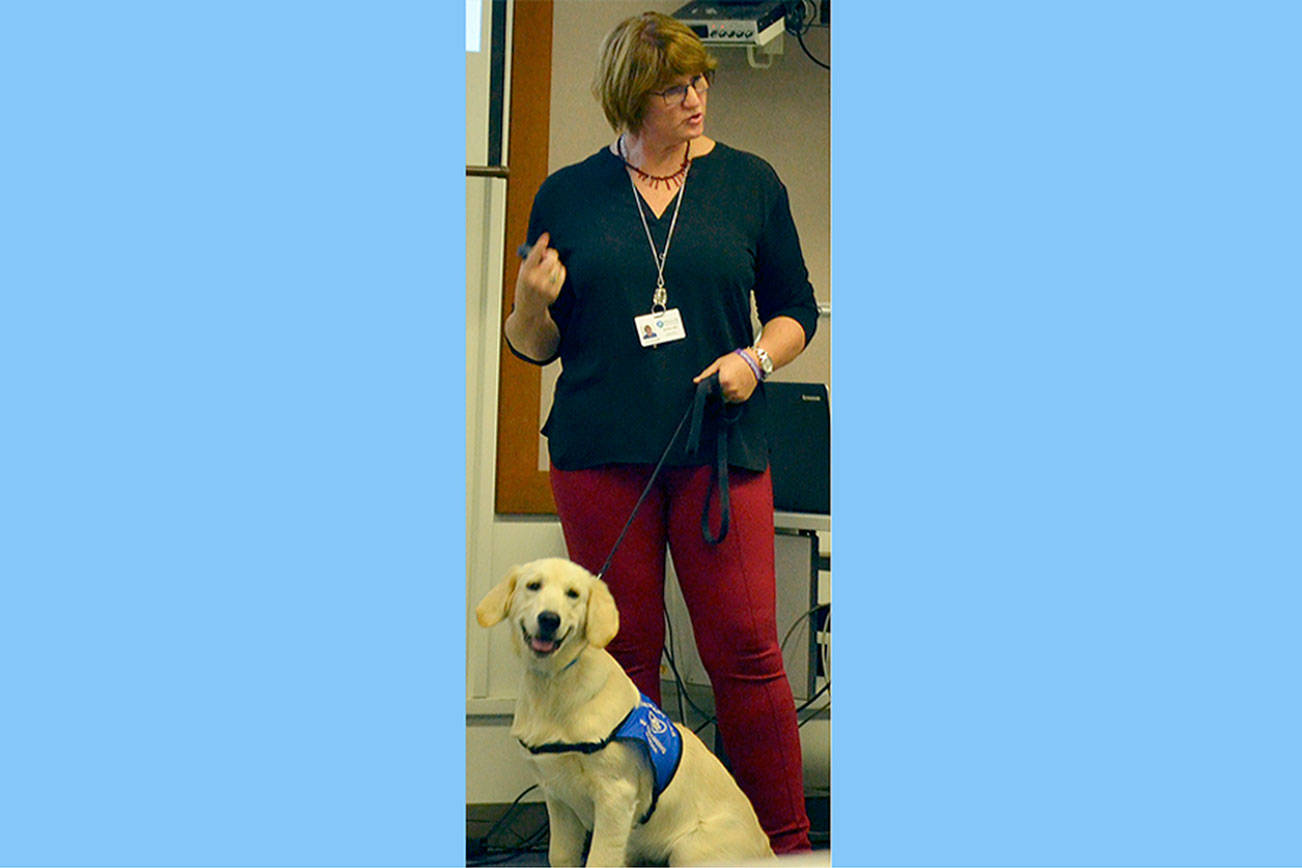MARYSVILLE – “Show me the money.” If that’s what you think lobbyists do to get bills passed, think again. It’s not that simple.
Al Aldrich, senior vice president of Strategies 360 in Seattle, has been the city of Marysville’s lobbyist in Olympia for eight years. He also lobbies for Arlington and looks for any opportunity that will help the local chambers of commerce.
He’s had some huge wins for both. Most notable is the huge Connecting Washington transportation package passed in 2015.
“There were lots of conversations about that,” he said. In the $16 billion law, Marysville benefits by getting the Highway 529 interchange OK’d off of Interstate 5. That will allow traffic to bypass the traffic-clogging railroad tracks to get in and out of Marysville. He felt good about $50 million project because the city had already paid to have some preliminary work done.
He wasn’t sure about getting the $50 million for the 88th and 116th interchanges, but he felt good about Highway 531 and its $39.3 million expansion.
“There’s a tremendous need” there, he said, adding Arlington Mayor Barb Tolbert was the one who sold it. He was surprised 156th received $42 million in funding. “That was like whip cream on your chocolate,” he said.
Also in that package is hardening the shoulder between Everett and Marysville for traffic use during the commute.
There are more lobbyists, 150, than there are lawmakers, 147. Instead of paying lawmakers money, lobbyists actually get laws passed by forming coalitions. The more people and areas that benefit from a law, the more it is likely to pass.
“Lobbyists talk to each other,” Aldrich said. “No one lobbyist can know everything. You have to be organized and take lots of notes. It’s hard to keep your mind multi-tracking.”
He added that getting the support from groups like trade associations or the Association of Washington Cities can help your chances of bill passage.
Aldrich actually represents nine entities. He also represents the cities of Stanwood and Sedro-Woolley. “They have many things in common,” he said of the four cities.
For example, they each have issues with abandoned homes. The banks don’t manage them and squatters move in. Cities want the power to evict them. But police lack the power in most cities to do much. This year the chance of a law passing has improved because he has found that Spokane also has a huge problem with this issue. So he plans to join that effort on nuisance property because it also affects those cities. “When you know other people share your concerns” the bill isn’t just for one city, so it is more likely to pass, he said.
Aldrich doesn’t just work for cities. He has nine clients, including some in health and transit. Not only does he look for support for bills, he also looks for apathy – meaning they don’t care either way. “I look for help from other lobbyists,” and vice versa, he said. “Does my client care?”
If the client doesn’t, maybe Aldrich can help.
“It’s about relationships, my track record working with other lobbyists,” he said. “Sometimes you don’t need help, sometimes you do. You find out who cares about your bill positive or negative then tighten up your coalition.”
Aldrich said only about 20 percent of bills introduced get to government. “That’s quite an attrition rate,” he said, adding they get stuck in traffic or don’t make deadline.
He said about 20 percent of bills are “message bills.” Those often are very specific bills introduced for the folks back home. But because they are so narrow in scope, they often don’t go anywhere.
Lawmakers look at up to 2,000 bills each session, so they only “skim through to the ones they care about,” Aldrich said.
For this year, Aldrich is looking for funding for an overpass at the railroad tracks at Grove Street. He’s also hoping for something on 88th. He’s also hoping for more state funds for the Waterfront Trail. The Olympic View Park project received $500,000 toward a $1.2 million estimate. The park will provide a regional connection to the new Ebey Waterfront Trail as well as the Harborview park trail system. The park will include parking improvements, restrooms, observation and interpretive areas, play areas, picnicking and shoreline access for cartop boating.
For Arlington, he’s hoping to focus on maximizing its industrial land. He’s also trying to protect the fastest-growing tax stream in the state, which is cannibas. “They’ve had zero problems with grow operations,” he said of Arlington. He’s also working on the Manufacturing Industrial Center for both communities.
Working with lawmakers
Aldrich, obviously, works a lot with lawmakers from the three legislative districts that represent Marysville and the one, the 39th, in Arlington. He said that’s good because that means nine legislators care about an issue instead of just three.
Plus, some of the lawmakers are in powerful positions.
He mentioned that Sen. Steve Hobbs is in Transportation, which is “good for the whole county.” Sen. John McCoy is No. 4 in line for the Senate Democrats. Rep. Dan Christianson is the minority leader. “He can’t sponsor a bill but he can be in a position to leverage himself.”
He’s also been impressed with newcomer Carolyn Eslick.
She “made a good first impression. People who come out of local government make good legislators,” he said.
He also works with local leaders, including: Marysville Mayor Jon Nehring, Chief Administrative Officer Gloria Hirashima, parks director Jim Ballew, and Public Works director Kevin Nielson. In Arlington, he works with City Administrator Paul Ellis, and Airport director David Ryan, among others. He also works with groups such as highway users, Marysville Tulalip Chamber of Commerce, of which he is a board member, and labor organizations.
Why he changed careers
Aldrich, a 1976 graduate of Washington State University, wasn’t always a lobbyist. He worked for Snohomish County Public Utility District for 22 years, the first 11 as government affairs director. He dealt with lobbyists all the time and thought it might be something he might want to do. A communications major, he had the right skill set, so when there was an opening he took it.
One bill he was happy to get through was the one that allows a tax break for some businesses in the Marysville-Arlington MIC. “That was just part of the puzzle,” he said.
Aldrich worked on that for five years. He talked with legislators, committee chairs and anyone else who could get into the path of the bill. Some didn’t understand why a tax break would bring in more companies. Aldrich had to convince them that more tax money would be brought in in other ways. Since that funding hurt only local tax dollars, Aldrich told the state lawmakers, “You guys shouldn’t worry about that.” As each year passed, more cities liked the idea for the tax break.
“It’s like a Rubic’s Cube. You keep turning it until everything lines up,” he said.
Marysville Tulalip Chamber of Commerce
No. 1 is Business and Environmental Stewardship. It will support laws that create a strong business community with as little negative impact on the environment as is reasonably and economically possible.
No. 2 is Competitiveness. That includes maintaining and establishing new business incentives, also supporting the Marysville-Arlington Manufacturing Industrial Center.
Resolutions were passed for the next two priorities: Education and Workforce, along with Health and Human Services.
Resolution 1 says, in part, the chamber understands the challenges of the legislature fully funding basic education. Its goals should be:
•Investments that increase student opportunities, develop challenging academic standards and improve student outcomes.
•Funding not only needs to be for K-12, but also post-secondary education.
•And don’t forget education for the growing unfilled skilled jobs.
It also supports, among other concepts, a simple majority vote to pass school bond issues, and addressing funding inequities between school districts.
Resolution 2 simply recommends that since the state only funds a minimal level of basic education, voters in the Marysville School District are encouraged to vote for the program and operations levy, along with the technology and capital levy, that will be on the Feb. 18 special election ballot.
Resolution 3 deals with health and human services regarding affordable housing, homelessness, mental health and substance abuse issues. It will support laws that enhance the provision of much-needed human service programs in the area and statewide.
No. 3 under other legislative principles are Transportation and Infrastructure, along with Workers Compensation Reform.
It says it will support transportation reforms that reduce project costs and delays. It also wants protection for projects in the 2015 Connecting Washington revenue package, which includes an I-5 ramp at southern Marysville and other local projects. Finally, it supports the city’s request for an overcrossing on Grove Street that would allow vehicles to bypass the railroad tracks.
Under L&I, the chamber says it’s too expensive and complex, and needs to be streamlined to reduce costs.
Association of Washington Cities
1. Address housing conditions. New construction sales tax reimbursement pilot program to attract new multifamily housing. Mitigate impacts of abandoned homes. Address shortages and affordability.
2. Direct funds to mental health, chemical dependency and social safety net programs.
3. Foster business development
4. Increase law enforcement training funds.








